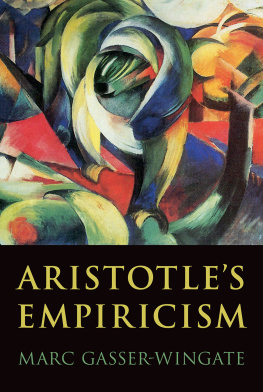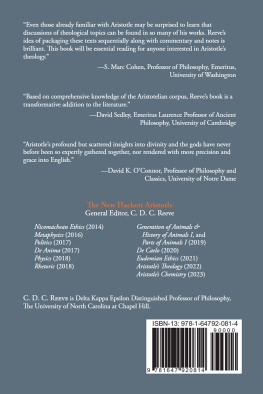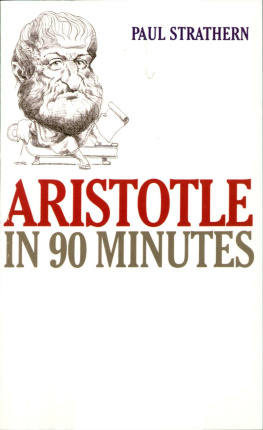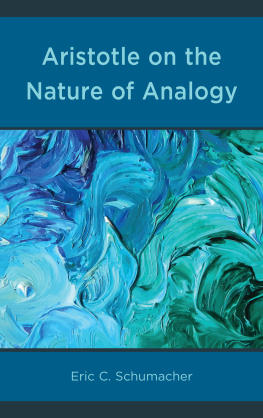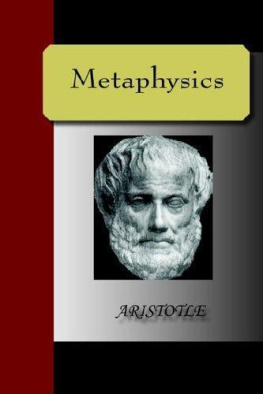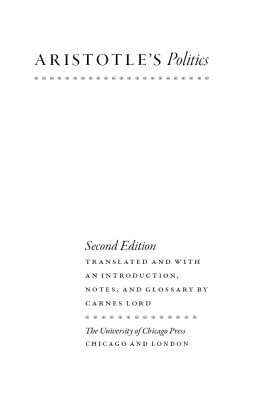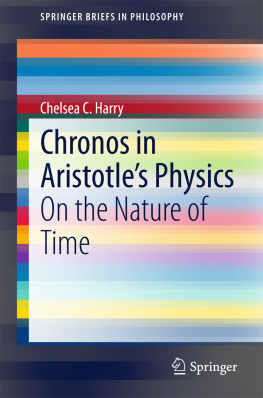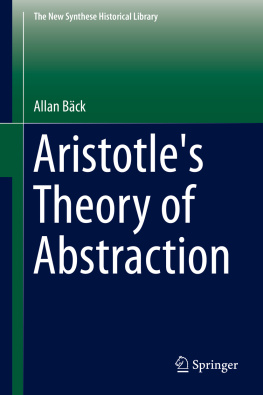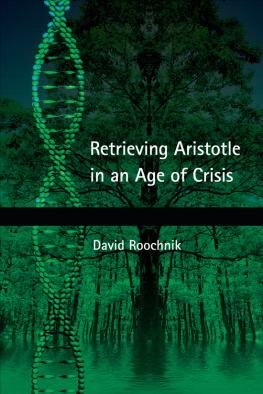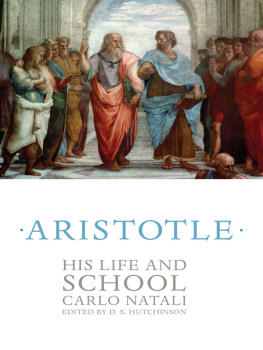Aristotles Empiricism

Oxford University Press is a department of the University of Oxford. It furthers the Universitys objective of excellence in research, scholarship, and education by publishing worldwide. Oxford is a registered trade mark of Oxford University Press in the UK and in certain other countries.
Published in the United States of America by Oxford University Press
198 Madison Avenue, New York, NY 10016, United States of America.
Oxford University Press 2021
All rights reserved. No part of this publication may be reproduced, stored in a retrieval system, or transmitted, in any form or by any means, without the prior permission in writing of Oxford University Press, or as expressly permitted by law, by license, or under terms agreed with the appropriate reproduction rights organization. Inquiries concerning reproduction outside the scope of the above should be sent to the Rights Department, Oxford University Press, at the address above.
You must not circulate this work in any other form and you must impose this same condition on any acquirer.
Library of Congress Control Number: 2021932106
ISBN 9780197567456
eISBN 9780197567470
DOI: 10.1093/oso/9780197567487.001.0001
Acknowledgments
The questions animating this project are ones I became interested in while working on my doctoral thesis at Harvard. I am deeply grateful to my advisors, Mary Louise Gill, Rusty Jones, Alison Simmons, and Gisela Striker, for their comments and guidance during those years.
Papers discussing various arguments developed in the book were presented at conferences and workshops at Brown University, Dart-mouth College, Harvard University, Northwestern University, the University of Pennsylvania, Providence College, the University of Sheffield, Temple University, the University of Toronto, and at the 2018 Eastern APA, the 2018 SAGP Annual Meeting, the 2018 Boston Summer Workshop, the Tahoe Ancient Philosophy Workshop, and the Orange Beach Epistemology Workshop. I am thankful to the audiences at these events for their criticism and feedback. Thanks are also due to my wonderful colleagues at Boston University, who generously commented on early, unpolished drafts of this material; to the Boston University Center for the Humanities, whose Junior Faculty Fellowship provided me with a critical semester of research leave; and to the CABAL and its associates for the supportive and stimulating philosophical community they help create. As Aristotle reminds us, we can all do philosophy alone, but we do it better with friends.
For helpful discussions about the central ideas developed in this book, I thank: David Charles, Sukaina Hirji, Robert Howton, Dhananjay Jagannathan, Colin King, Emily Kress, Jim Lennox, Hendrik Lorenz, Keith McPartland, Katy Meadows, Benjamin Morison, Jessica Moss, Christiana Olfert, Evan Rodriguez, David Roochnik, Susan Sauv Meyer, and Jacob Stump. I also wish to thank Katja Vogt and an anonymous reader for Oxford University Press, who provided very detailed and careful comments on every part of the manuscript. The book owes much to their efforts. Finally, I am especially thankful to David Bronstein, whose thoughtful and always generous comments greatly improved the central arguments in the book; to Doug Kremm, for his steady philosophical spirit and for always being a willing interlocutor; to Patricia Marechal, for countless, invariably helpful conversations about nearly every aspect of the book; and to Whitney Schwab, for looking at early chapter drafts and keeping me honest during research leave.
Some parts of on behalf of BSHP. I wish to thank these presses for permitting the inclusion of the relevant materials. I also wish to thank Peter Ohlin, my editor at Oxford University Press, for his sound advice and his interest in this project, and Zara Amdur, for her help compiling the books index. Any errors are of course my own responsibility.
Above all I thank my partner, Amanda, for her patient, loving, and insightful support. I owe her more than I can express.
Contents
Aristotle is famous for thinking that all our knowledge comes from perception. Of course, we acquire knowledge in many different ways we learn from our teachers, parents, colleagues, and friends, or from accumulated personal experience, or through various forms of reasoning, or indeed out of mere force of habit. But all these forms of learning, Aristotle thinks, rest on some sort of prior knowledgethe knowledge of our teachers, say, or of the premises in our arguments, or of our own past experiences. And generally this prior knowledge will itself depend on further prior knowledge. Where does the regress end With perceptual knowledgethe only sort of knowledge that is not itself derived from anything prior. Perception is thus supposed to provide a bedrock for our learning, by supplying us with knowledge in a way that doesnt depend on our already having some knowledge at our disposal.
This view of our cognitive beginnings plays a central role in Aristotles epistemology. Hes sometimes considered the first empiricist for having held it. But its not immediately clear what the view is meant to entail. Its not clear, for instance, what the knowledge perception supplies would contribute to the more advanced states that Aristotle takes to derive from itstates like experience (), craft knowledge (), or scientific understanding (). Nor is it clear how we should understand the nature of its contribution what it might mean for various forms of knowledge to be based on or derived from perceptual knowledge. Indeed, to some ears it will already sound puzzling that there could be such a thing as perceptual knowledge, or that any form of knowledge would emerge directly from perception, without any sort of inference, or any (perhaps implicit) reliance on our existing beliefs or conceptual resources. My aim in this book is to shed some light on these questions: to give an account of the sort of empiricism Aristotle espoused, and of his broader conception of perceptions place in our cognitive lives.
Of course empiricism is a slippery label. To say that all our knowledge issues from perception is not yet to say that perception itself plays a more than incidental role in our learning. Platos middle dialogues provide a good illustration of this point: perception is presented as a necessary starting point for our learning because it prompts a form of recollection that supplies us with expert knowledge. But perception isnt itself characterized as an epistemically valuable state: it prompts recollection by perplexing us, summoning thought and awakening the intellect into recovering knowledge already present in our souls, and which might serve to sort out what perception alone could not make clear. On this kind of view perception does serve as a starting point for all our learning, insofar as it occasions the rest of our cognitive development. But it doesnt provide an edifice for more advanced forms of knowledge, or supply the basic materials from which these forms of knowledge would be derived.
Even if perception did serve as some sort of edifice, one might wonder just how much it could teach us on its own. For Aristotle often emphasizes that our capacity to perceive is a capacity we share with all animals, and which yields a form of knowledge far removed from the sort of theoretical understanding he takes as his cognitive idealas he puts it in the Metaphysics, to perceive is common to all, and therefore easy, and nothing wise (A2 982a1112). In particular perception doesnt tell us

